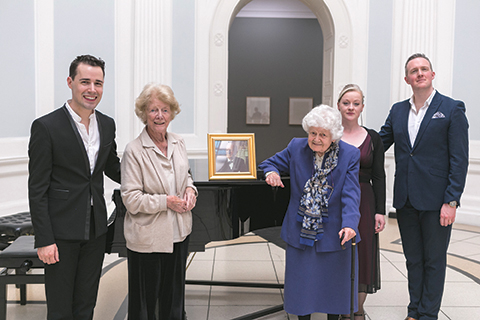Two weeks ago, there was a significant celebration in the National Concert Hall as March 30 marked the 100th birthday of the doyenne of our musicians, Sheila Larchet-Cuthbert. Invited guests, including yours truly, gathered in the John Field Room for chat and refreshments before moving into the auditorium where the NSO had just completed its morning rehearsals.
Conducted by Alexander Shelley, son of pianists Howard Shelley and Hilary Macnamara, of this parish, the orchestra launched into ‘Happy Birthday, dear Sheila’, which we all sang with gusto. Former colleague, Lindsay Armstrong, gave the ‘few words’, written by another peer, Brian O’Rourke, who was, unfortunately, unable to be present. The birthday girl, still cared for at home by her only daughter, Mary, graciously responded. It was a joy to be part of such an historic event.
Born into a musical family with its origins in the Normandy region of France, Sheila’s father John F. Larchet had married pianist Madeleine Moore in 1913. He became a senior professor in harmony and counterpoint at the RIAM and quite soon was appointed UCD’s professor of music, holding that position until retirement in 1959. His relatively small compositional output includes a charming piece, The Waters of Moyle, with important parts for harp, viola and horn, thus enshrining his family — Sheila, Máire and Gerry – in the score.
A UCD graduate, Sheila sat her exams in the Great Hall, which is now the NCH. In the course of her playing career Sheila was also principal harpist with the Liverpool Philharmonic and Hallé Orchestras – the latter at the expressed wish of Sir John Barbirolli.
In Brian O’Rourke’s words, “Sheila’s honorary doctorate of philosophy from the Dublin Institute of Technology was conferred in recognition of her outstanding achievements and contributions as musician, teacher, mentor, arranger, composer, researcher, historian and passionate advocate of the Irish harp”.
Internationally, she has been a board member of the World Harp Congress and was the administrator of its Dublin meeting in 2005. But as Brian O’Rourke also pointed out, “all this pales into insignificance beside her stature as a person, supportive colleague and loyal friend”.
A wonderful raconteur, her stories of the lighter side of Dublin’s ‘classical’ music scene are enlivened by her uncanny recall of the many accents of visiting conductors of the RÉSO/RTÉSO/NSO with innocent humour. Ad multosannos.
Two recent NSO concerts had positive virtues – one with young Dublin pianist Eoín Fleming (24) in Beethoven’s Emperor Concerto – the work with which he made his Carnegie Hall, New York debut in 2016 — and the other with Hanoverian clarinettist Sebastian Manz in Mozart’s Concerto.
Conducted by New Zealander Gemma New, Mr Fleming’s interpretation of the Beethoven was imposing and noble in the opening Allegro, graceful and song-like in the central Adagio and exhilarating in the final Rondo.
Mr Manz’ playing of the Mozart, under Maestro Shelley, was just perfect. His phrasing had an ethereal beauty with an extraordinary variety of mellow musical hues flowing with exquisite poise. The audience was captivated by musicianship par excellence.


 Niall Kinsella, MáireLarchet, Sheila Larchet-Cuthbert, Raphaela Mangan and Gavan Ring at Hugh Lane Gallery, Dublin in this file photo.
Niall Kinsella, MáireLarchet, Sheila Larchet-Cuthbert, Raphaela Mangan and Gavan Ring at Hugh Lane Gallery, Dublin in this file photo. 
